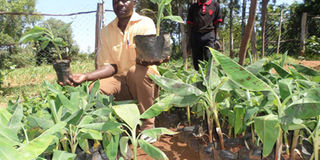Plastic ban to hit seedlings sector as firms adopt new technology

A man displays banana seedlings in plastic seedling bags. Stakeholders in the tree seedlings sector have raised concern that the looming government ban on plastic materials for packaging will affect their nursery operations. PHOTO | FILE | NATION MEDIA GROUP
What you need to know:
- The ban, which takes effect in August, is set to seriously affect operations of most tree nurseries in the country, which heavily rely on poly tubes for growing seedlings.
- Ellepot paper is less expensive than plastic pots.
- Ellepot can be produced with different types of growing media such peat, coco fibre dust, perlite, vermiculite and seagrass.
Stakeholders in the tree seedlings sector have raised concern that the looming government ban on plastic materials for packaging will affect their nursery operations.
The ban, which takes effect in August, is set to seriously affect operations of most tree nurseries in the country, which heavily rely on poly tubes for growing seedlings.
Charity Munyasya, Kenya Forest Service (KFS) Deputy Director for Forest Conservation and Management, while welcoming the ban admitted it would affect their operations, but they are moving to other technologies.
“We have no option but to shift to other alternatives for tree nursery propagation like Swaziland Beds and other environmentally friendly technologies,” said Munyasya.
While Swaziland beds remain an option for KFS, which produces 150 million tree seedlings annually, it might not be a viable option for private commercial tree nursery operators. According to African Forest, there are 3,000 to 5,000 private tree nurseries in Kenya that produce about 115 million seedlings per year.
The Tree Biotechnology Programme Trust (TBPT), which operates several nurseries in the country, however said it would not be affected by the ban as they stopped using the poly-tubes in 2007 after acquiring the environmentally friendly Ellepot Propagation System, comprising of Ellegaard potting machine and a non-woven biodegradable paper pot, Ellepot. It starts dissolving after seedlings have been transplanted in the field.
“For years, we had been agonising on how to improve our efficiency to meet the ever growing demand for the superior eucalyptus clones and seedlings. We were also consciously aware of the millions of non-biodegradable plastics we were pumping into the environment with the disposal of poly tubes that we depended on for potting the seedlings,” stated Dr Benson Kanyi, Executive Director, TBPT.
Ellepot paper is less expensive than plastic pots. For instance, a 35mm by 75mm Ellepot costs about 45 cents. A similar poly tube costs Sh1.
It also provides the best conditions for the rooting of young plants leading to fast rooting and healthier plants.
Ellepot can be produced with different types of growing media such peat, coco fibre dust, perlite, vermiculite and seagrass.




